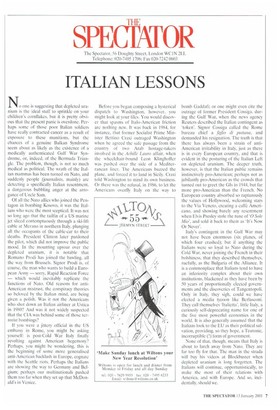SPECTATOR
The Spectator, 56 Doughty Street, London WC1N 2LL Telephone: 020-7405 1706; Fax 020-7242 0603
ITALIAN LESSONS
No one is suggesting that depleted uranium is the ideal stuff to sprinkle on your children's cornflakes, but it is pretty obvious that the present panic is overdone. Perhaps some of those poor Italian soldiers have really contracted cancer as a result of exposure to these munitions, but the chances of a genuine Balkan Syndrome seem about as likely as the existence of a medically authenticated Gulf War Syndrome, or, indeed, of the Bermuda Triangle. The problem, though, is not so much medical as political. The wrath of the Italian mammas has been turned on Nato, and suddenly people (journalists, mainly) are detecting a specifically Italian resentment, a dangerous bubbling anger at the arrogance of Uncle Sam.
Of all the Nato allies who joined the Pentagon in bombing Kosovo, it was the Italians who were the most sceptical. It was not so long ago that the tailfin of a US marine jet sliced contemptuously through a ski-lift cable at Merano in northern Italy, plunging all the occupants of the cable-car to their deaths. President Clinton later pardoned the pilot, which did not improve the public mood. In the mounting uproar over the depleted uranium, it is notable that Romano Prodi has joined the bawling, all the way from Brussels. Signor Prodi is, of course, the man who wants to build a European Army — sorry, Rapid Reaction Force — which would inevitably replicate the functions of Nato. Old reasons for antiAmerican mistrust, the conspiracy theories so beloved by the Italian mind, are being given a polish. Was it not the Americans who shot down an Italian airliner at Ustica in 1980? And was it not widely suspected that the CIA was behind some of those terrorist bombings?
If you were a jittery official in the US embassy in Rome, you might be asking yourself: is post-Cold War Italy finally revolting against American hegemony? Perhaps, you might he wondering, this is the beginning of some more generalised anti-American backlash in Europe, cognate with the Seattle riots. Perhaps the Italians are showing the way to Germany and Belgium; perhaps our multinationals pushed them too far when they set up that McDonald's in Venice. Before you began composing a hysterical dispatch to Washington, however, you might look at your files. You would discover that spasms of Italo-American friction are nothing new. It was back in 1984, for instance, that former Socialist Prime Minister Bettino Craxi outraged Washington when he agreed the safe passage from the country of two Arab hostage-takers involved in the Achille Laiiro affair, when the wheelchair-bound Leon Klinghoffer was pushed over the side of a Mediterranean liner. The Americans buzzed the plane, and forced it to land in Sicily. Craxi told Washington to mind its own business. Or there was the refusal, in 1986, to let the Americans overfly Italy on the way to bomb CiacIdafi; or one might even cite the outrage of former President Cossiga, during the Gulf War, when the news agency Reuters described the Italian contingent as 'token'. Signor Cossiga called the Rome bureau chief a figlio di puttana, and demanded his resignation. The truth is that there has always been a strain of antiAmerican irritability in Italy, just as there is in every European country, and that is evident in the posturing of the Italian Left on depleted uranium. The deeper truth, however, is that the Italian public remains instinctively pro-American; perhaps not as jubilantly pro-American as the crowds that turned out to greet the GIs in 1944, but far more pro-American than the French. No European country absorbed so rapturously the values of Hollywood, welcoming stars to the Via Veneto, creating a eaffe American°, and showing barely any resentment when Elvis Presley stole the tune of '0 Sole Mb', and sold it back to them as 'It's Now Or Never'.
Italy's contingent in the Gulf War may not have been enormous (six planes, of which four crashed); but if anything the Italians were so loyal to Nato during the Cold War, never joining the French in their bolshiness, that they described themselves, ruefully, as the Bulgaria of the Alliance. It is a commonplace that Italians tend to have an inferiority complex about their own institutions, blackened as they have been by 50 years of proportionally elected governments and the discoveries of Tangentopoli. Only in Italy, they sigh, could we have elected a media tycoon like Berlusconi. They call themselves Italietta', little Italy, a curiously self-deprecating name for one of the five most powerful economies in the world. It is also generally assumed that the Italians look to the EU as their political salvation, providing, so they hope, a Teutonic, incorruptible (?) form of government.
None of that, though, means that Italy is about to lurch away from Nato. They are far too fly for that. The man in the strada will buy his videos at Blockbuster when depleted uranium is long forgotten. The Italians will continue, opportunistically, to make the most of their relations with America, and with Europe. And so, incidentally, should we.






























































 Previous page
Previous page